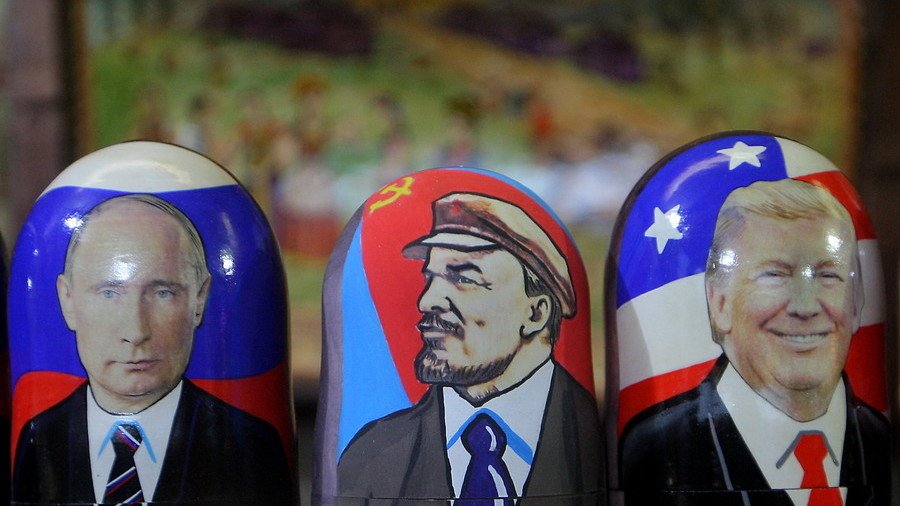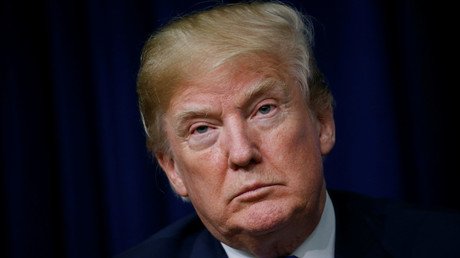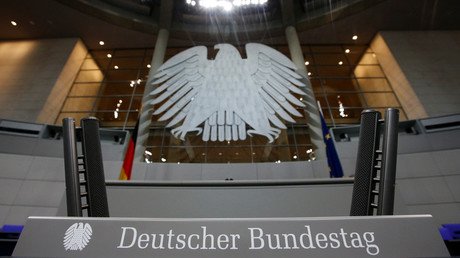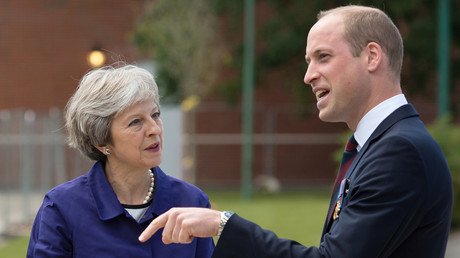Putin on the Trump: ‘New York’ dons tinfoil hat, claims Soviet-era kompromat on The Donald

This week, The Daily Intelligencer promoted the theory that says the story of collusion between Donald Trump and Russia dates back to the Soviet period, an obvious attempt to sour the upcoming Putin-Trump summit.
Before embarking upon the wildest conspiracy theory to emerge since Sasquatch was filmed in his natural habitat many years ago, author Jonathan Chait begins his multi-page marathon, entitled, ‘Will Trump Be Meeting With His Counterpart — Or His Handler,?’ by assuring readers that he will “responsibly speculate” about the trials and tribulations of Russiagate without “falling prey to [conspiracy theory] fallacies.”
Forgive me for spoiling the plot, but the author failed miserably on that count.
Chait's Hollywood-style escapade begins in April 2016, one month after WikiLeaks released a tranche of over 30,000 emails from Hillary Clinton's private server from when she was Secretary of State. At this time, an unidentified source in some Baltic state purportedly shares with then–CIA director John Brennan an audio recording of “Russians discussing funneling money to the Trump campaign.” Then (bear with me, dear reader), a few months later, Robert Hannigan, former head of the UK intelligence, flies to Washington to “brief Brennan on intercepted communications between the Trump campaign and Russia.” Sounds deliciously incriminating, right? Yes, it does, until the author informs us in anticlimactic fashion that “the contents of these communications have not been disclosed, but what Brennan learned … unsettled him profoundly.”
In other words, more of the same zero-calorie ‘nothing burger’ the public has been fed for almost two years with regards to Russiagate.
Naturally, the obvious question is, ‘why haven’t the communications that so ruffled Brennan been disclosed?’ Here we are in mid-2018, the second year of the Russiagate fiasco, and Special Counsel Robert Mueller is desperately searching for a gotcha moment to prove his investigation hasn’t been a massive waste of time and resources. Who knows? Maybe the Democrats can even get their wish and impeach Trump. In other words, this is a perfect time for Brennan to reveal his hand. Yet, he has chosen not to, and this strongly suggests he was bluffing the entire time.
A highly partisan, incomplete, and deeply flawed report by a broken House Committee means nothing. The Special Counsel’s work is being carried out by professional investigators—not political staffers. SC’s findings will be comprehensive & authoritative. Stay tuned, Mr. Trump.... https://t.co/Jx3jh8fomu
— John O. Brennan (@JohnBrennan) April 27, 2018
So instead of Chait pursuing that serious question, he opts to steer his leaky boat away from the realm of plausibility and straight into the rocks, asking if it would be “dangerous not to consider the possibility” that the upcoming Trump-Putin summit is “less a negotiation between two heads of state than a meeting between a Russian-intelligence asset and his handler.”
For those who may have missed that last quote, I'll repeat it: Chait suggests the upcoming meeting between Trump and Putin will resemble "a meeting between a Russian-intelligence asset and his handler.”
At this point, the writer teleports his readers back to the waning days of the Cold War, to the very heart of the Soviet Union, where, he imagines, the dogged capitalist Donald Trump was first compromised by some communists. There are so many rabbit holes and impossible doors in this fantastic tale that you almost expect a grinning Cheshire cat to rear its head at any time between the lines.
Welcome to Russia, Comrade Trump!
Rewind to 1987. Donald Trump, aged 41, owns a large swath of the Monopoly board. A successful real estate developer and New York socialite, he is also the bestselling author of ‘The Art of the Deal’. But then he makes a fateful decision that would – at least according to the Daily Intelligencer – change his life forever: he and his ex-wife Ivana decide to visit Moscow (cue lightning and thunder, female scream).
1987 is Trump's breakout year. There are only a couple of examples of him commenting on world politics before then. In a 1980 NBC interview he complained about Iran humiliating the US and first mentioned taking the oil. (cc @tcwittes) 1/n
— Tom Wright (@thomaswright08) June 9, 2018
“He stayed at the National Hotel, in the Lenin Suite, which certainly would have been bugged,” observes Chait, as if somehow Trump, who built much of his fortune on hotel construction, would not have considered the very same possibility. “There is not much else in the public record to describe his visit, except Trump’s own recollection in The Art of the Deal that Soviet officials were eager for him to build a hotel there (It never happened).”
Sounding more like Tom Clancy than Seymour Hersh, Chait warns that Trump could have fallen prey to the KGB’s “basic tool kit of blackmail” that he presumes works on “greed, stupidity, ego, and sexual appetite,” values any Liberal will tell you the US leader has no shortage of.
Fortunately, Chait does not indulge his readers with any salacious Soviet-era scenarios involving prostitutes, hotel beds and bodily fluids, although the idea that some sort of sordid activity may have occurred while the Trumps were in town screams between the lines.
“It is not difficult to imagine that Russia quickly had something on Trump, from either exploits during his 1987 visit or any subsequent embarrassing behavior KGB assets might have uncovered,” the author informs us. However, since no such “exploits” are known to have occurred during Donald and Ivana’s well documented Soviet excursion, Chait seems to believe that gives him artistic license to fill in the blanks as he dreams appropriate. And though he admits it would seem “slightly insane” to imagine that a “secret relationship” between Trump and Russia dates back to the Soviet era, he pushes aside those psychological concerns and trudges on anyway.
It's 1987. The Eastern Bloc is crumbling: food shortages, national liberation movements, anti-communist sentiments all across the board, Russia just got completely screwed in Afghanistan, oil is at $14-17/b.. That's when USSR flips a NY real estate magnate to work for them.
— андрей (@Andrew_Ryvkin) July 10, 2018
Upon Donald and Ivana’s return home from sightseeing in Moscow and St. Petersburg, Chait finds it suspicious that Donald is “fired up with political ambition.” How so? Well, Trump takes out a full-page newspaper ad in the New York Times, the Washington Post and the Boston Globe that heaps scorn on Japan and Saudi Arabia for using the US military to defend their oil routes and supplies without reimbursing the United States. This sounds strikingly similar to the argument Trump made on the 2016 campaign trail: “Why are these nations not paying the United States for the … billions of dollars we are losing to protect their interests?”
Essentially, this was a very pricey letter to the editor that allowed Trump to air his opinions on an issue that had very little relationship to the Soviet Union. For the Daily Intelligencer, however, this was proof perfect that Trump had been compromised by the Soviets and was now working directly against American interests.
“Trump’s letter avoided the question of whom the U.S. was protecting those countries from. The primary answer, of course, was the Soviet Union,” Chait notes with satisfaction as if he had just cracked the Da Vinci Code. “After World War II, the U.S. had created a liberal international order and underwritten its safety by maintaining the world’s strongest military. A central goal of Soviet, and later Russian, foreign policy was to split the U.S. from its allies.”
Yet we just saw Trump make practically the same claims against shell-shocked NATO members this week. The fiscally conservative US leader railed against those countries that are “getting a free ride” from the US taxpayer, which, it cannot be denied, does pick up the bulk of the defense tab. Does this mean Trump has plans to put the military dinosaur on the endangered species list? Absolutely not. Although he may complain a lot about NATO and its European freeloaders, Trump is using aggressive business tactics in order to negotiate from a position of strength and leverage in order to get what he wants. Thus, not only did he agree to NATO accession talks to Macedonia during this week’s NATO summit in Brussels, he also slammed Germany for cooperating with Russia in the construction of the Nord Stream 2 gas pipeline.
What good is NATO if Germany is paying Russia billions of dollars for gas and energy? Why are there only 5 out of 29 countries that have met their commitment? The U.S. is paying for Europe’s protection, then loses billions on Trade. Must pay 2% of GDP IMMEDIATELY, not by 2025.
— Donald J. Trump (@realDonaldTrump) July 11, 2018
Now if that does not disprove the grand theory that Trump has been serving as some sort of Soviet-made Manchurian Candidate for the last 30 odd years, how can it be explained that the Republican leader has taken a far more aggressive stance against Russia than his predecessor, Barack Obama.
For example, following extremely tenuous accusations leveled by the UK against Russia over the Skripal affair, Trump, without waiting for any sort of formal investigation, ordered the expulsion of 60 Russian diplomats and the closure of the Russian consulate in Seattle. In December 2016, Obama, by comparison, expelled ‘only’ 35 Russian diplomats in retaliation for alleged Russian meddling in the 2016 election (although Obama’s move could be considered far more diplomatically distasteful since the diplomats were kicked out during the holidays).
In Syria, meanwhile, where Russia has been battling Islamic State terrorists, Trump, in response to the unlikely scenario that Syrian President Assad was responsible for carrying out chemical attacks on rebel positions, ordered attacks on pro-government Syrian forces on two separate occasions, a militaristic move Obama never made.
Finally, almost one year ago, Trump signed legislation imposing a permanent sanctions regime on Russia and limiting presidential authority to lift them without congressional authority. The US leader faced insurmountable pressure against vetoing the legislation, and in the end succumbed to endorsing it.
Does any of the above sound like the actions of a president who is somehow a “Kremlin puppet”? Hardly. Chait, probably aware of the Swiss-cheese nature of his argument, was forced back to square one when he said that even if the Russians “did not have a back-channel relationship or compromising file” on Trump in 1987, that doesn’t mean they don’t have one now.
Today, after two years of listening to every sordid tale, which run the gauntlet from Russian prostitutes to American adult film stars, and all dirt in between, the world is still waiting anxiously for Robert Mueller to present a single shred of evidence that proves the Kremlin somehow assisted the mogul of Manhattan into winning the White House.
It’s too bad, especially considering the fine writing talents of Jonathan Chait, that we are nowhere closer to understanding the truth today than we were yesterday.
Like this story? Share it with a friend!
The statements, views and opinions expressed in this column are solely those of the author and do not necessarily represent those of RT.
















